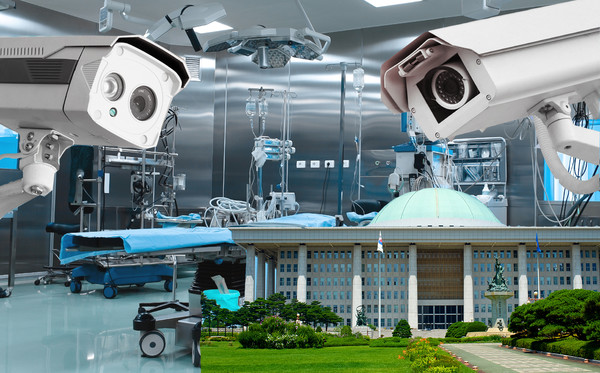The Covid-19 pandemic did not come to an end in 2021. The pandemic was the most worrying social issue this year. Korea has been fighting Covid-19 for two years but is still struggling. The pandemic was not the only issue in the medical community this year. For the first time in the world, Korea enacted legislation to mandate the installation of surveillance cameras in operating rooms. Korea Biomedical Review has compiled the five biggest medical industry stories in 2021. – Ed.

On Aug. 31, the National Assembly passed a revision to the Medical Service Act to mandate the installation of surveillance cameras in hospital operating rooms. The revision bill was promulgated on Sept. 24 and will take effect from Sept. 25, 2023, after a two-year grace period.
Calls for protecting patients from medical malpractice grew intensely in December 2014 when a social media post revealed that plastic surgeons were having a birthday party and playing with breast implants in the operating room where an unconscious patient was lying on the bed.
The incident sparked a probe of the health authorities and finally led to the mandatory installation of CCTV cameras in operating rooms in 2021.
Korea is the only country in the world that obligates surveillance cameras in operating rooms.
A bill mandating the installation of CCTV cameras in operating rooms was first proposed by then Rep. Choi Dong-ik of the New Politics Alliance for Democracy in 2015. The bill used to be scrapped due to the medical community’s strong opposition to the bill but finally passed the National Assembly in six years.
According to the revised law, hospitals must install CCTV cameras inside operating rooms.
If a patient or a patient’s guardian requests CCTV shooting in the operating room, surgeons cannot refuse to do so unless there is a justifiable reason.
Justifiable reasons include cases where the operation is delayed, the patient's life is at risk, emergency surgery is performed to prevent serious physical and mental disorders, and high-risk surgery that requires active measures to save the patient’s life. In addition, if there is a possibility that the CCTV shooting may impair the training of a trainee physician, the shooting can be refused.
Those who breach the installation and shooting duties will be fined 5 million won ($4,215) or less.
A person who detects, leaks, falsifies, or damages CCTV information will face imprisonment up to five years and a fine of 50 million won ($42,626) at maximum.
Hospitals that lost, leaked, or changed the CCTV footage in the operating room due to insufficient measures to ensure the safety of CCTV cameras will face up to two years of imprisonment and a fine of up to 20 million won.
However, the medical community is already suffering a setback due to the mandatory CCTV installation. Hospitals’ recruits for 2022 showed that interns avoided choosing surgery for their residency, which was why doctors vehemently opposed cameras in operating rooms.
Application rates for surgery, thoracic surgery, and obstetrics/gynecology fell by about 10 percentage points, respectively. This phenomenon was observed across the nation.
The Catholic Medical Center and the Severance Hospital in Seoul failed to fill vacant positions in surgery, thoracic surgery, and obstetrics/gynecology departments.
The Korean Medical Association, which could not block the parliament approval for CCTVs in operating rooms, formed a task force to pre-emptively respond to future discussions over subordinate statutes.
The KMA’s response will decide how strong the ramification of the mandatory CCTV law will be next year.
Subordinate statues are expected to include CCTV installation standards, the scope of recording and the procedure for recording request, detailed reasons for refusal to shoot CCTV due to emergency surgery that can be life-threatening, justifiable reasons for refusal to shoot filming, procedures for viewing and providing recorded video, storage standards and reasons for extension of the storage period.
Thus, there will be a second battle between doctors and the government over setting the subordinate statutes for the mandatory CCTV installation law in 2022.

